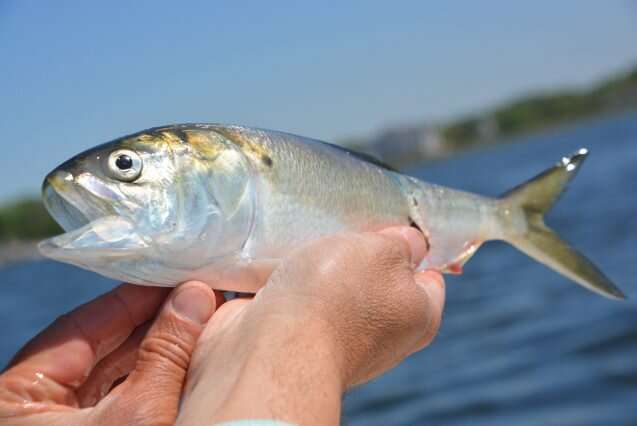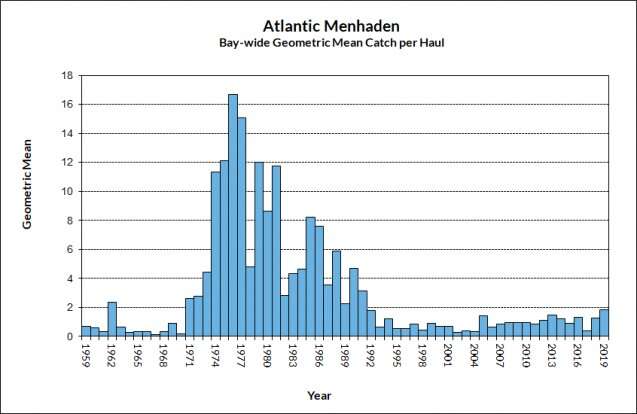You can help protect a fish species that is vital to oceanic ecosystems

Omega Protein Corp and Omega Protein, Inc. may not be household names, but many of their products are. These two companies, collectively known as "Omega," compose one of the largest reduction fishing organizations in North America. They capture and process fish known as menhaden, then resell the "reduced fish" for use in pet food, agriculture and aquaculture feed, and human fish oil supplements. By mass harvesting menhaden, Omega is putting the marine ecosystems in the Atlantic Ocean and the Gulf of Mexico at risk, while also violating the Clean Water Act and other federal laws.
Menhaden (commonly known as bunker or pogy) are considered one of the most important fish in the sea. They are a type of forage fish, or filter feeders, mitigating harmful algal blooms while also being a vital food source for whales, striped bass, redfish, eagles, osprey and many other animals.
According to the Chesapeake Bay Foundation, in 2005, the population of this vital species reached a record low since the 1940s, and has remained low for the last 20 years. Yet companies like Omega catch and process about 6 billion menhaden per year. Without immediate change, Omega's actions have the potential to damage the food web and continue to drive down populations of striped bass and other predator species that rely on menhaden for food. A study in 2017 found that reduction fishing caused a nearly 30% decline in the population of Atlantic striped bass, the most popular marine game fish species in the country.
Stricter fishing regulations and monitoring, especially in the Chesapeake Bay, are essential. In the meantime, consumers can help save menhaden by avoiding Omega products and switching to menhaden alternatives, thus decreasing the market demand.
Omega's environmental violations
Throughout Omega's company history there have been many accounts of regulatory breaches, ranging from surpassing the fishing limit and violating the Clean Water Act to falsifying information to qualify for federal loans.
Omega received government funding under the condition that they would be in compliance with federal environmental regulations. However, in 2013 the Environmental Protection Agency (EPA) prosecuted Omega for two wastewater violations in Virginia. The first offense occurred between May 2008 and September 2010, when the company illegally dumped fish waste, or bail water, from its processing facility into Virginia's coastal waters. To make matters worse, the bail water contained additional pollutants and chemicals. Between April 2009 and September 2010, Omega proceeded to violate the Clean Water Act once again; its fishing fleet was caught discharging wastewater directly into the sea. The wastewater was oily and contaminated with waste from the ship. Omega pleaded guilty to these violations, resulting in a three-year probation period, a $5.5 million fine, and $2 million payment to the National Fish and Wildlife Foundation specifically allocated to restoration projects in the Chesapeake Bay.
Despite the opportunity to implement ethical and responsible procurement practices, Omega did the opposite. In 2017 it became apparent that Omega had not only violated the terms of the previous plea agreement, but also discharged pollutants in the Gulf at its Louisiana site. Yet again, Omega pleaded guilty to dumping wastewater in 2014 and 2016. The resulting plea deal consisted of another three-year probation period, a $1 million fine and $200,000 corporate community service. It is discouraging that the second punishment was less aggressive, with the fine decreasing from $5.5 million to $1 million.
In addition to the various Clean Water Act offenses, Omega falsified information in both annual and quarterly reports, violating the antifraud provision in the U.S. Securities Act and the reporting provision of the Exchange Act and Rules.
To apply and gain approval for federal loans, Omega signed a contract stating that the company was in compliance with federal environmental regulations, that they had not received any notices regarding prior violations, that there were no pending investigations or suits against them, and that they would notify the National Marine Fisheries Service of any events that may impact the conditions of the agreement. By December 2014, Omega had qualified for $21.1 million in government borrowings from five different loans. A number of the reports that they filed in order to receive these loans were falsified. They were also required to develop and maintain an environmental checklist, but did not implement either.

In addition to these legal compliance violations, Omega was recently charged under the Endangered Species Act when its boats were caught speeding through the mid-Atlantic right whale seasonal management areas. The whales travel through these areas as they migrate and use them as calving grounds. Right whale populations are declining rapidly; with only 100 females left, Omega Protein is further endangering the species by recklessly speeding through their protected habitat.
Aside from all of Omega's harmful actions against the environment, there have been a handful of employee health and safety violations. Sadly, many of these violations have resulted in employee deaths, ranging from a worker getting caught in a "rotating screw conveyor" to the explosion of a storage tank that contained methane and hydrogen sulfide. Omega Protein is also responsible for multiple injuries resulting from operational incidents on their boats. These events include vessel collisions and a dock supervisor being "sucked in" to an industrial vacuum which is used to remove fish from the ship. In addition to these tragic events, in 2012 the United States Department of Labor cited 25 health and safety violations. Omega settled most of these incidents out of court, but in 2014, a case did go to court; the judge ruled in Omega's favor regarding the death of a 24-year-old who was caught in the rotating conveyor.
Ultimately, the facts above speak for themselves. Omega's corruption and lack of concern for both the environment and its employees is jarring. It is critical to boycott any products that can be tracked to Omega Protein through the value chain. I hope that you too will join the fight to save menhaden and protect the Atlantic and the Gulf by consuming alternative, responsibly sourced products.
Menhaden alternatives
In an effort to protect and restore menhaden populations, many organizations are advocating for ecosystem-based management and improved fishing regulations, but these can take a long time to be approved and then implemented. While it is critical to support stronger regulations and improved management, we can all make an immediate change by reading labels and switching to sustainable alternatives.
Unfortunately, there is increasing demand for farmed fish, leading to a rise in menhaden harvesting and processing to make fish pellets (or feed for these farmed fish). Salmon and shrimp farmers rely heavily on menhaden pellets. Consumers who wish to protect menhaden, marine ecosystems and the oceanic food web should boycott farmed salmon and shrimp, opting for a more sustainable wild-caught alternative.
When grocery shopping, consumers can also look for grass-fed meat and poultry in order to be certain that these animals were not fed pellets derived from menhaden.
When discussing human supplements, it is important to note that there is scientific evidence stating that it is not necessary to take fish oil supplements if you have a balanced, healthy diet. Regardless, some people enjoy the benefits of taking fish oil in order to get omega-3s, DHA and EPA into their diet. Fortunately for menhaden, you can get the same nutrients from algae-based supplements. Microalgae is a vegan, sustainable alternative that is gaining popularity.
Unfortunately, there is a lack of affordable, fish-free pet food currently available, but there are a few viable options on the market that contain the same nutrients but are sourced from soy and peas. It is pertinent to demand that Purina and other staple pet food companies be more responsible and ethical in sourcing their products. If we, as consumers, do not hold these large corporations accountable, they will continue to deplete our natural resources in order to turn a profit.
As the climate crisis continues to worsen, the ocean will continue to undergo unprecedented stress, making it more imperative than ever to reduce our negative impacts on these fragile and diverse ecosystems.
Provided by Earth Institute at Columbia University
This story is republished courtesy of Earth Institute, Columbia University http://blogs.ei.columbia.edu.




















